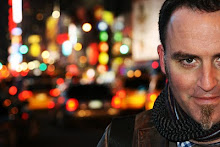"Picture lock", which is the moment when the visuals for a film are locked into place, came about 8 hours late at 4pm. This is effectively the stage at which my work on any project, give or take the odd glance or approving look, is done.
From then on in, the process of grading begins. Each shot is painstakingly coloured to make everything look shiny and consistent. Louise carefully worked her way through the opening sequence, but when we came to view it back, it became apparent that we'd made the shots look aspirational rather than real. The whites were really zingy and the colours glowed and flowed like jewels in a Victorian tiara. The estate looked glorious; like a set of beautiful terraced dolls houses, but it wasn't the White City Estate. It was no longer real.
I immediately panicked, and started demanding that colour and contrast were removed from all the shots, and slowly the estate, as I know it, began to return. It was a curious sensation. Suddenly Louise understood what I was trying to communicate; "you want a look don't you? You need this film to look bleak, don't you?" And she was right.
It's actually rather brave to spend time grading a film in order for it to look only subtly different from the rushes, but in this instance the process is more about matching shots so that a muted, sadder, earthy look flows from one location to the next.
As the film develops, we can probably afford to warm things up a little, particularly for some of the dance sequences, and the section in Mostafa's Egyptian cafe, but I am absolutely convinced that we've made the right decision.
What I'm less sure about is the BBC Editorial Policy's feelings that the sequence in our film which features two Somalian women talking about the issue of female genital mutilation, should be censored from any screenings with children in the audience and have effectively asked us to make two edits of the film; one with the sequence and one without.
In the wake of the Savile business, there's an almost terrifying sense at the BBC that children need to be protected, even if it means shielding them from learning about something which could ultimately save their life.
Knowing that FGM is illegal could well mean a child voices concerns to a teacher if, say, at the age of 8, she hears she's going back to Africa for a "little procedure like Mummy had."
Personally, and I stress that this is only my opinion, I think the benefits of screening the film in front of children far outweigh any potentially uncomfortable conversations or situations which it might generate. Children should be able to ask their parents what FGM is, particularly on an estate where it actually happens.
As I film maker, I feel it is my duty to raise awareness. The sequence is in no way graphic and I'm proud to feature it as part of the film. Furthermore, I'm proud of the brave, strong Muslim women who are speaking out against the practice and are desperate for their message to be heard by young people.
Obviously, the issue is by no means black and white. It's important for me to make my personal feelings on the issue clear, but equally important to remember that the Editorial Policy department at the BBC is filled with many people whose minds are far greater and less knee-jerk than my own. We have asked them to reconsider their decision and it is for them to weigh up the pros and cons of this particular argument. It's also
important for me to reiterate that they are not proposing we censor the film per se, just, that we give it a sort of 18-rated "director's cut" alongside something a little more "universal". Their decision is final and will, of course, be respected.

No comments:
Post a Comment
Note: only a member of this blog may post a comment.